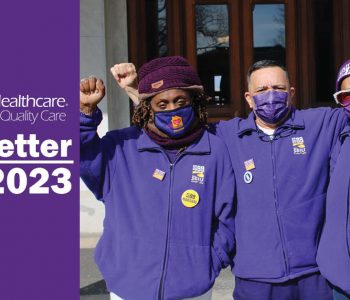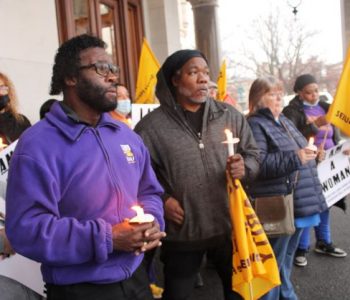
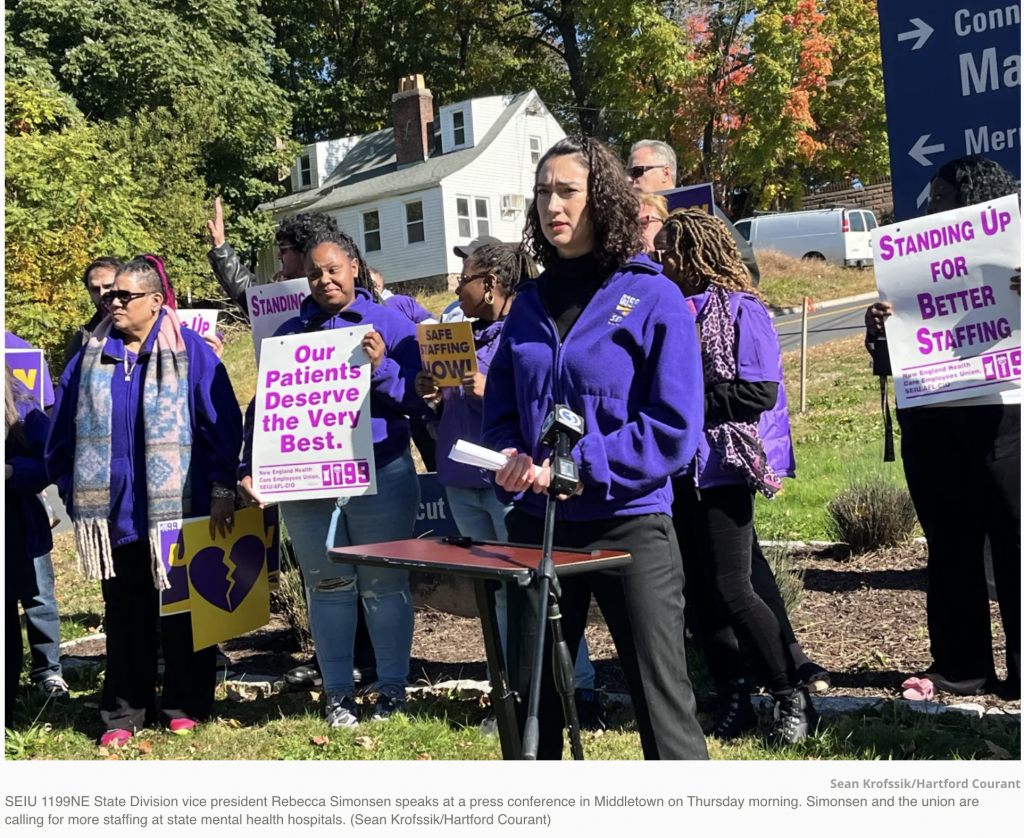
Workers at Connecticut mental health hospitals are calling for increased staffing to correct what they say are dangerous conditions for workers and patients.
Members of SEIU 1199NE, a union that represents about 7,000 health care workers including the Connecticut Department of Mental Health and Addiction Services and the Connecticut Department of Children and Families, say the state should fill 676 vacancies and reverse all aspects of the soft freeze on hiring. The union is also calling on increased staffing based on patient needs as well as preparing the state budget to reflect the real needs of the population.
About 30 union members met on the corner of Eastern Drive and Silver Street in Middletown on the grounds of Connecticut Valley Hospital this week to speak out about how the lack of staffing is making their jobs harder.
During the event led by 1199NE State Division Vice President Rebecca Simonsen, union members criticized what they claim is lack of action from the state of Connecticut, specifically DMHAS commissioner Nancy Navarretta.
Many called on state lawmakers to provide the necessary funding needed to fill the jobs.
“We are here today because the staffing crisis across our agencies has gone unaddressed for too long,” Simonsen said. “It is putting both workers and the patients that they care for in an immediate and serious danger.”
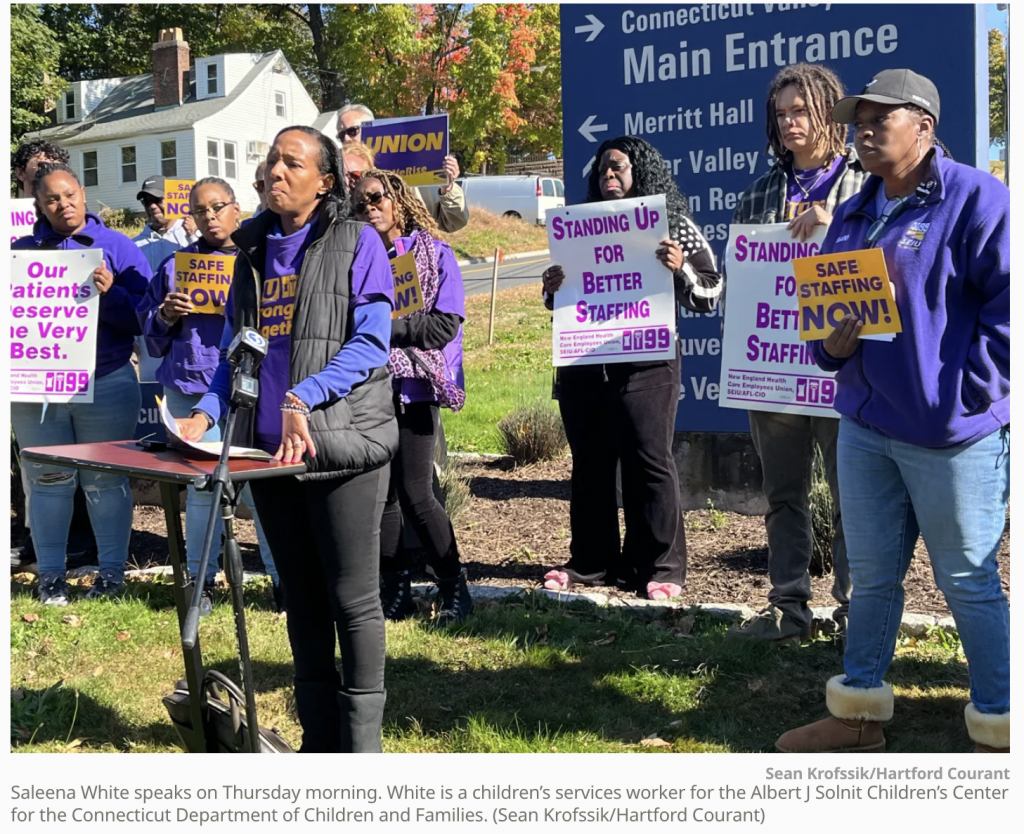
Simonsen said many patients are in the middle of an acute mental health crisis and are battling addiction or in the grips of the opioid epidemic.
“These are often people living in poverty, often without private insurance. Many have been turned away from the private sector because their needs are too complex or too severe,” Simonsen said.
“DMHAS is supposed to be their lifeline, and right now that lifeline is frayed. There are over 600 vacancies, and the agencies are simply not filling them or not filling them fast enough,” Simonsen said. “Staffing levels across the board are too low and aren’t safe, and workers are struggling to give the quality of care the patients deserve.”
Simonsen said the department’s leadership has failed to address the severe staffing shortages and added that budget cuts are the reason.
“Does this sound right to you?” Simonsen said. “Do you think it’s right that they are balancing the budget on the backs of our patients and workers? This is not acceptable. Especially when you are living in the wealthiest country and the wealthiest state in the history of the world. We aren’t standing by, we are taking action. Over 1,700 of our members representing a super majority of DMHAS signed a super petition demanding urgent action by the commissioner on both safety and staffing.”
Simonsen said they have made little progress.
“Budgetary concerns are still their priority,” Simonsen said. “The Office of Policy and Management is claiming a budget crisis and blaming the so-called guard rails. Or what we like to call them, the fiscal roadblocks. The effects of these roadblocks show the agency is prioritizing cuts over care.”
“Today we have to ask, can DMHAS under its current leadership fulfill its obligation for the safety of our workers and provide the care the most vulnerable people in our state deserve?” Simonsen continued. “As of now, the answer has been no. This is eroding our confidence in the leadership of DMHAS. But that can change. We want it to change with real leadership and commitment to solving this crisis.”
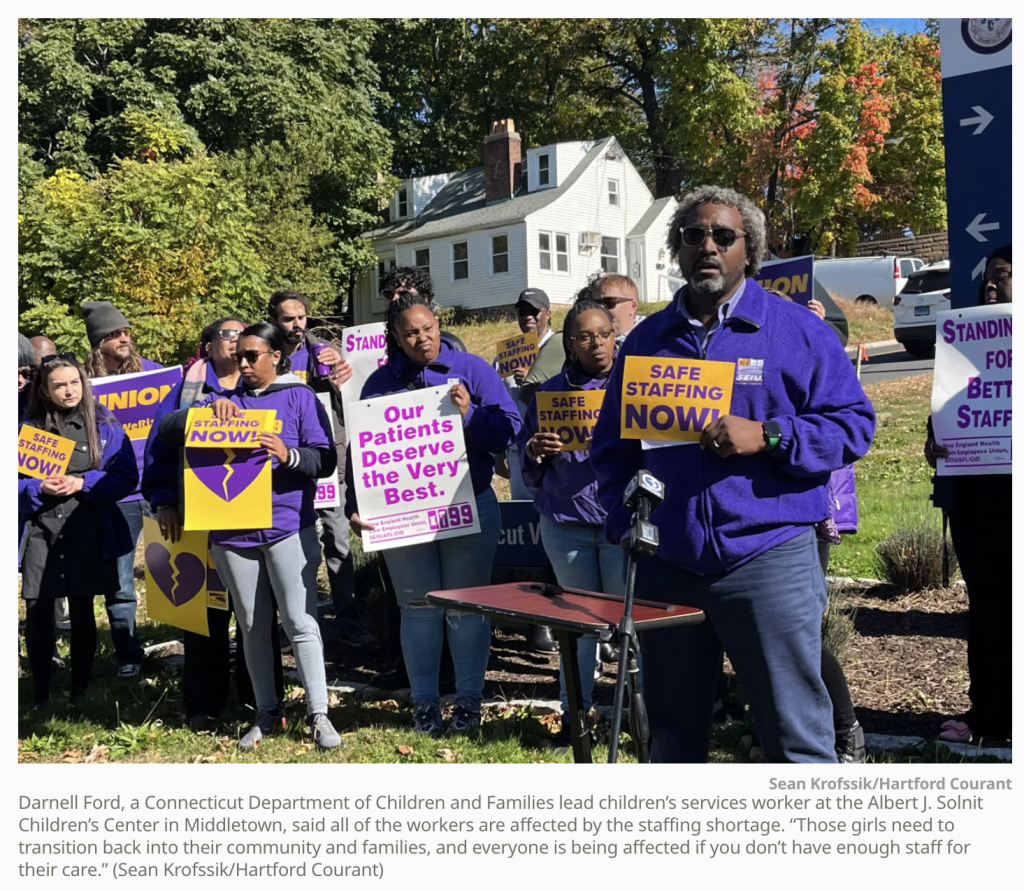
A spokesperson for the Connecticut Mental Health and Addiction Services, Office of the Commissioner said “DMHAS remains committed to ensuring a safe working environment for all.
“We are proud to note that our staffing levels today are higher than they were before the pandemic, and we have worked diligently to address both staffing needs and worker safety,” the spokesperson said. “Safety is a top priority at DMHAS, which is why we have strong emergency response systems and maintain staffing ratios based on acuity that prioritize both the safety of our employees and the individuals we serve. We value the voices of our employees and remain dedicated to addressing concerns through collaboration.”
But Darnell Ford, a Connecticut Department of Children and Families lead children’s services worker at the Albert J. Solnit Children’s Center in Middletown, said “all of our workers are being affected by the shortage from admitting the patients, caring for them and making sure we have a therapeutic environment and resources that they need to save lives, build skill and get back out into the community.”
“There are two sides of the Solnit Center — there’s a hospital side and there’s a psychiatric treatment facility for all girls. Those girls need to transition back into their community and families, and everyone is being affected if you don’t have enough staff for their care.
“Just imagine if you are in crisis for these children,” he added. “You are talking about all of their traumatic experiences and the maladaptive ways in which they tried to survive, whether it’s trying to hurt themselves or hurting others.”
Tyler Kimball, a mental health assistant at Connecticut Valley Hospital, said the staffing shortage has made her time at work much more difficult.
“I’m here on behalf of my patients and co-workers and we are in a staffing crisis right now. We need more people in order to do the important work that we are doing,” Kimball said. “We are badly understaffed to the point where we don’t have time with any engagements or compassionate, personable work. Everything is just in passing. We can make sure at the very least the patients are safe, but there is no room for compassion and care and that leaves us as mental health workers, who have that desire to contribute to our community. We feel we can do more but we need help to do that.”
Kimball works on the traumatic brain injury unit and treats all ages.
“As the state deems us appropriately staffed, it’s still insufficient and it’s still not enough to do what we are supposed to do,” Kimball said. “We need bodies and people in case someone needs to be sent to an emergency or someone needs to go to the hospital or someone is just struggling that day. We need to have people available to provide support.”
Kimball said she works second shift, which typically has even less workers on duty.
“This is a 24-hour facility and patients’ needs don’t stop just because there is a shift change,” she added. “We have to provide a safe and therapeutic environment. We are asking a lot of them. They are here for help, and we need to provide that environment for them… Right now, we need to hire more people, and if that’s a process that’s going to take some time, we need to acknowledge we don’t have adequate staff to do what we need to do.”
“It’s a privilege not to realize how big of a problem this is. Eventually, it’s going to become everybody’s problem. Mental illness doesn’t discriminate. It doesn’t care about class. It doesn’t care about race and religion. If you think about times that you struggle and your community and the people that you love are struggling. You need to put an emphasis on mental health care in case you are someone you know will need some help. You want to make sure these services are there for someone to support you,” she said.
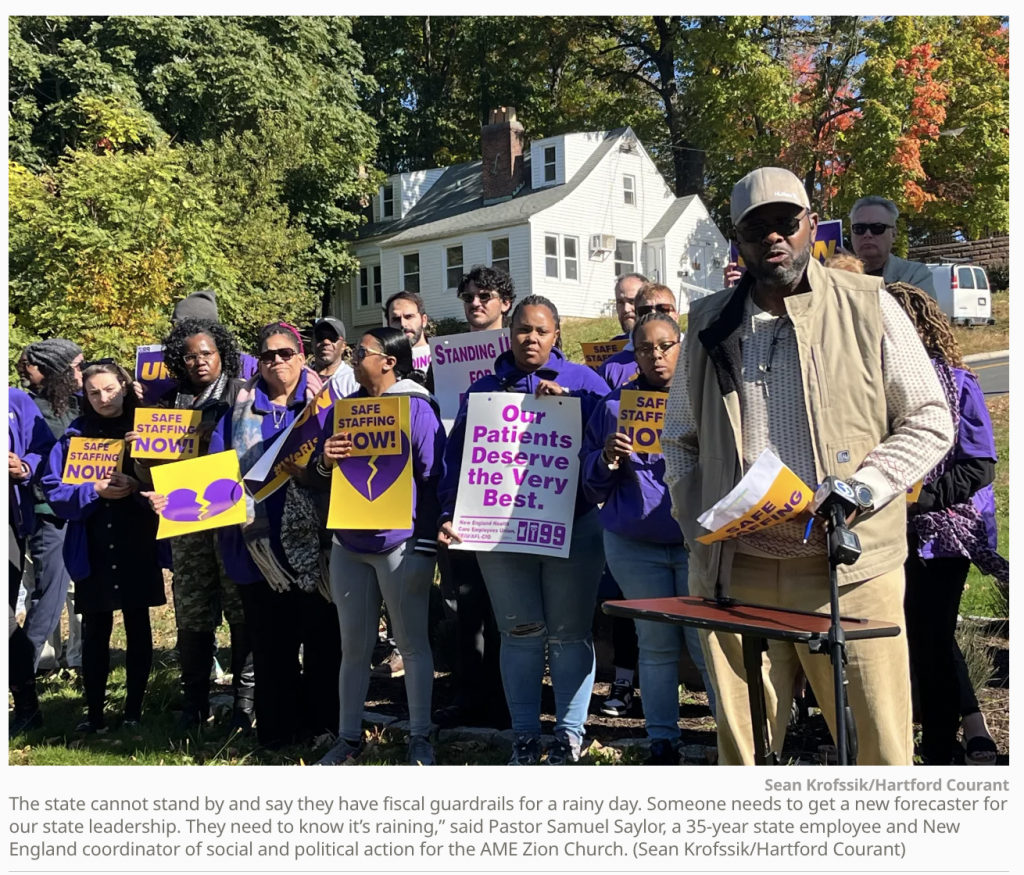
Sharon White is a mental health assistant at Connecticut Valley Hospital, a post she has held for more than two decades. She worked with the STAR Program, a specialized program that is designed exclusively for female patients in recovery rehabilitation, for 17 years. During COVID, the program was shut down. It was reopened in July, and White said it hasn’t been fully staffed since.
“It was once recognized as a model for the country and a model for other states. It’s not the same,” White said. “We need staffing. This is the worst staffed unit in all of CVH, and I don’t understand why. It’s such a great program for women but they can’t staff it.”
Previously there were a maximum of 34 patients staffed by 11 people. Now there are five staffers.
“That’s not fair,” White said. “Sometimes these ladies don’t even get to go to the dining room to have meals. Sometimes the meals are brought to them in a Styrofoam tray. Because we don’t have staffing, we can’t take them to the dining room.”
White said workers have left over the years and have not been replaced leaving a bigger burden on the remaining staff.
“They staff it now from other units. So, we will float and go help out somewhere else, so you go somewhere else where you aren’t as vested and they don’t really care about what is going on at that unit,” White said. “These ladies need more attention than let me put in my eight hours and go home. Sometimes they don’t even get to go outside for fresh air and that’s a simple thing. Everybody deserves fresh air, and we can’t even do that because of the staffing.”
Pastor Samuel Saylor, a state employee with the Department of Children and Families for 35 years as well as the New England coordinator of social and political action for the AME Zion Church, said the workers deserve support.
“We are sitting in the richest state of the Union and the wealthy deserve their wealth and we believe what they earn they should keep, but at the same time we put our lives on the line, and we deserve our lives and deserve to go home whole to our children and families,” Saylor said.
“The state cannot stand by and say they have fiscal guardrails for a rainy day,” he added. “Someone needs to get a new forecaster for our state leadership. They need to know it’s raining. It’s raining in the halls of DMHAS, it’s raining in the halls of DCF and other state facilities where healthcare workers are sacrificing their lives every day for those less fortunate than us. …The gap between rich and poor widens in Connecticut, and yet we go on as if nothing is wrong.”
Originally Published in the Hartford Courant: October 18, 2024 at 6:00 AM EDT

